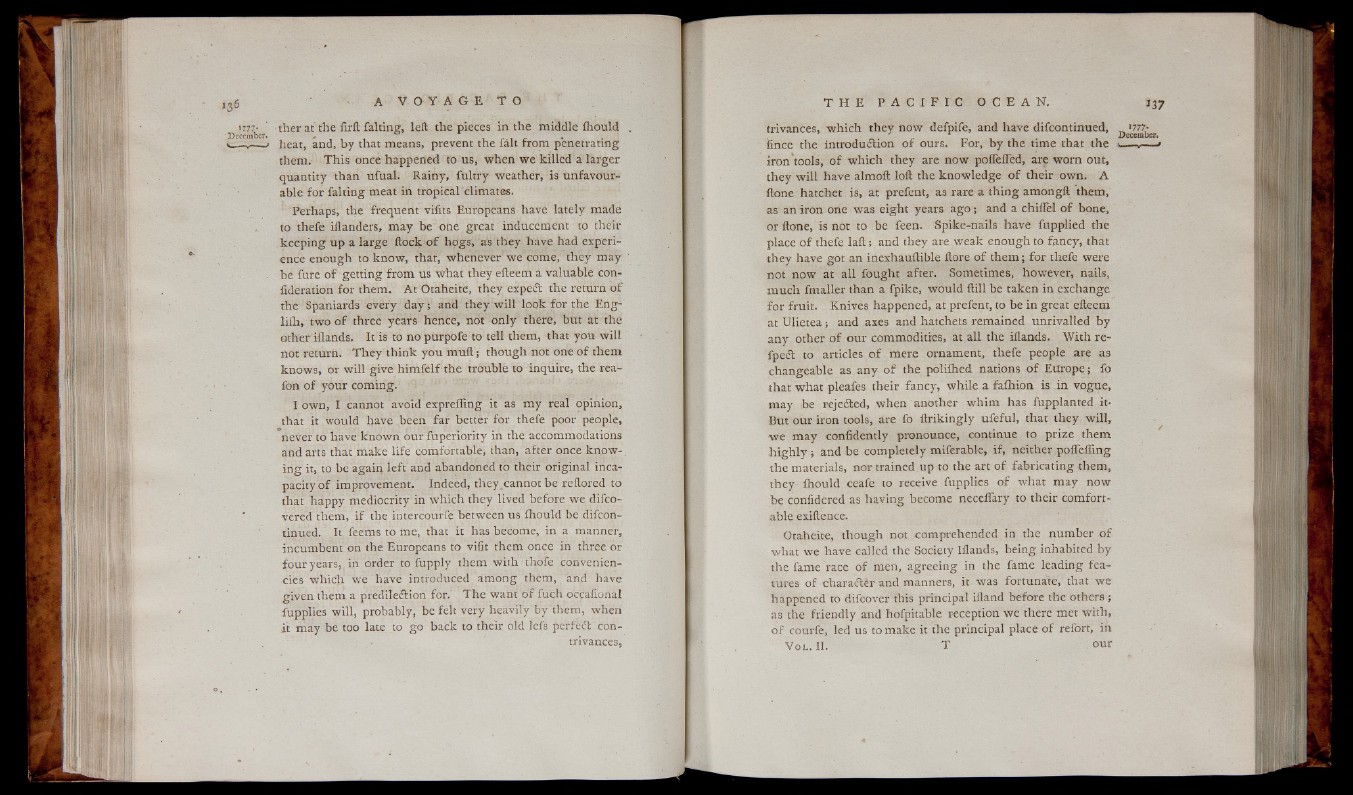
1777- ther at the firft falting, left the pieces in the middle ihould .
D e c em b e r . , ' . '
heat, and, by that means, prevent the fait rrom penetrating
them. T h is once happened to us, when w e killed a la rge r
quantity than ufual. Rainy, fu ltry weather, is unfavourable
fo r faltin g meat in tropical climates.
Perhaps, the frequent vifits Europeans have la te ly made
to thefe iflanders, may be one great inducement to their
ke ep in g up a large flock o f hogs, as they have had experience
enough to kn ow, that, whenever we come, they may
be fure o f getting from us what they efteem a valuable con-
fideration for them. At Otaheite, they expeft the return o f
the Spaniards every d a y ; and they w ill look fo r the Eng-
liih , two o f three years hence, not only there, but at the
other iflands. It is to no purpofe to tell them, that you w ill
not return. T h e y think y o u muft ; though not one o f them
knows, or w ill give h im fe lf the trouble to inquire, the rea-
fon o f your coming.
I own, I cannot avoid exprefling it as m y real opinion,
that it would have been fa r better for thefe poor people,
never to have known our fuperiority in the accommodations
and arts that make life comfortable, than, after once kn ow in
g it, to be agaip left and abandoned to their original incapacity
o f improvement. Indeed, they.cannot be reftored to
that happy mediocrity in w hich they lived before we difco-
vered them, i f the intercourfe between us ihould be difcon-
tinued. It feems to me, that it has become, in a manner,
incumbent on the Europeans to vifit them once in three or
four years, in order to fupply them with thofe convenien-
cies which w e have introduced among them, and have
g iv en them a predilection for. T h e want o f fuch occafional
fupplies w ill, probably, be felt very heavily by them, when
i t may be too late to go back to their old lefs perfect contrivances,
trivances, w h ich the y now defpife, and have difcontinued, „ ' 777-
s December.
fince the introduction o f ours. For, b y the time that the <_— .—
iron tools, o f w hich they are now pofiefled, are worn out,
the y w ill have almoft loft the kn owledge o f their own. A
ftone hatchet is, at prefent, as rare a thing amongft them,
as an iron one was e ight years a g o ; and a chiflel o f bone,
or ftone, is not to be feen. Spike-nails have fupplied the
place o f thefe la ft ; and they are weak enough to fancy, that
th e y have got an inexhauftible ftore o f th em ; for thefe were
not now at all fought after. Sometimes, however, nails,
much fmaller than a fpike, would ftill be taken in exchange
fo r fruit. Knives happened, at prefent, to be in great efteem
at U lie te a ; and axes and hatchets remained unrivalled by
an y other o f our commodities, at all the iflands. With re-
fpeCt to articles o f mere ornament, thefe people are as
changeable as any o f the poliftied nations o f Europe; fo
that what pleafes their fan cy , while a faihion is in vogue,
ma y be rejeded, when another w h im has fupplanted it-
But our iron tools, are fo ftrik in g ly ufe fu l, that the y w ill,
we m a y confidently pronounce, continue to prize them
h ig h ly ; and be completely miferable, if, neither poflefling
the materials, nor trained up to the art o f fabricating them,
they ihould ceafe to receive fupplies o f what may now
be confidered as having become neceflary to their comfortable
exiftence.
Otaheite, though not comprehended in the number o f
what we have called the Society Iflands, being inhabited by
the fame race o f men, a gre ein g in the fame leading fea tures
o f charaCtCr and manners, it was fortunate, that we
happened to difcover this principal ifland before the others ;
as the friendly and hofpitable reception we there met with,
o f courfe, led us to make it the principal place o f refort, in
V o l . II. T our